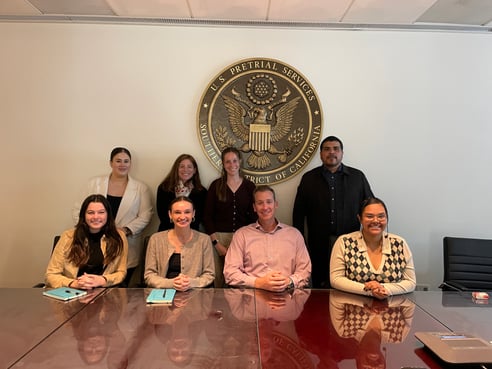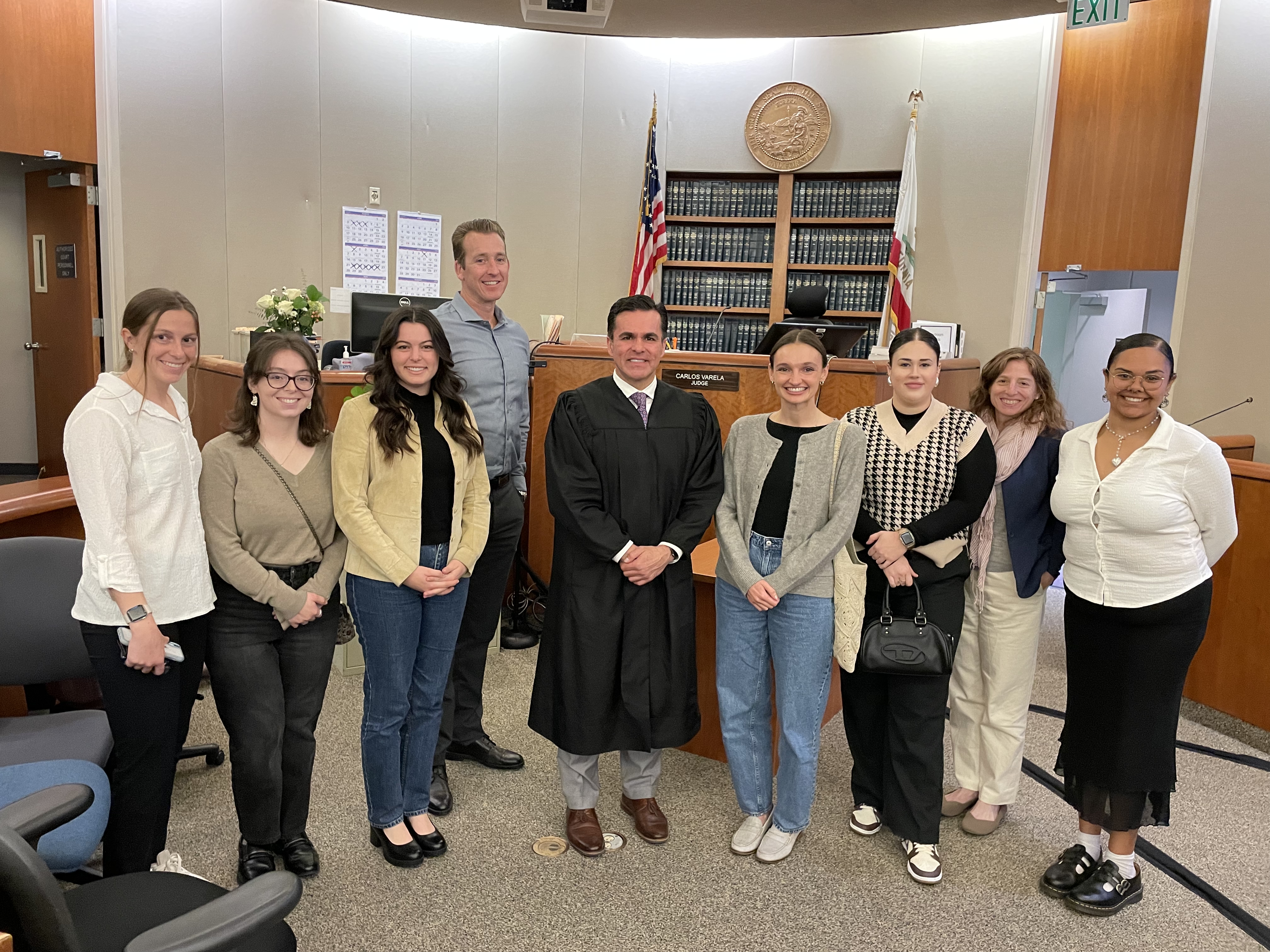The Joan B. Kroc School of Peace Studies prides itself in providing its students with the opportunity to apply the lessons they have learned in the classroom in the field through a variety of different field-based practicums. Through these practicums, students engage with professionals in their work environment, being able to ask them questions about the impact of their work, how they reached their current role, and ways in which they have utilized their education to create meaningful change.
Janice Deaton, lecturer for the Kroc School and alum of the MA in Peace and Justice program, is leading this year's Criminal Justice practicum and utilizing her years of experience as a lawyer and diverse network to take our students into the field to learn about the reality of the American justice system. “The idea is to show the students the difference between the theory you learn in law school and practice by applying what you learn to real-life scenarios in the criminal justice environment. From judges, police officers, to public defenders, students are allowed to ask their burning questions about how the justice system functions on a day-to-day basis.”
The first semester of the Criminal Justice practicum saw students addressing different areas of the judicial system such as prisons and prison reform, courts and prosecutorial powers, as well as alternatives to policing.
By utilizing the hands-on approach of field-based courses, the students in the Criminal Justice practicum interacted with local organizations such as Poetic Justice, whose mission is to offer restorative writing and creative arts programs to individuals who are incarcerated in women’s prisons and jails. Through active participation, students were paired with a pen pal to learn about them as individuals and understand more about their needs and what led them to be in their current situation.

Students meeting with Moises Santos at the Federal Pretrial Services Office
Students learned about the County of San Diego’s alternative to direct policing, the Mobile Crisis Response Team, which offers support to people experiencing a behavioral health crisis. MCRT is an alternative to law enforcement response and can help by stabilizing people in the community, connecting people to community resources and treatment services, and avoiding a trip to the hospital or jail. This alternative to policing, the students learned, has reduced the risk of unnecessary altercations that arise from the lack of training that police officers receive to handle situations involving those experiencing a behavioral health crisis.
Danielle Spilker-Wilson, an alumni of the Kroc School MS in Conflict Management and Resolution program, and retired Investigator for the San Diego County District Attorney's Office, met with students to discuss her experiences in law enforcement and the gaps that she recognized existed within the judicial system. Danielle now works as an instructor for the San Diego County Regional Leadership Institute teaching courses to introduce participants to the concept of critical conversations; high-stakes, high-emotion conversations that can easily derail team collaboration.
Students pictured with Superior Court judge Carlos Varela, whom they learned more about alternatives to our traditional criminal justice system.
This spring semester, Janice Deaton has curated experiences for our practicum students to be able to visit with local judges and public defenders in courtroom settings to learn about the intense nature of the criminal justice environment. By sitting in on court hearings ranging from bail hearings, sentencing hearings, and trials, to drug cases, students have been able to acquaint themselves with how various court proceedings take place.
Students have also had the opportunity to tour the San Diego Metropolitan Correctional Center. The tour, led by the warden's office, begins from intake and includes a visit to the women's floor, offering participants an insight into the controlled environment and interactions between officers and inmates, aimed at reducing stigma and providing a harsh reality check about the criminal justice system, challenging preconceived notions and highlighting power dynamics.
The practicum will culminate with a Q&A session supported by the San Diego County Regional Institute where students will meet with members of the Federal Bureau of Investigation (FBI), Drug Enforcement Agency (DEA), and San Diego Police Department. This session will allow for compassionate curiosity through tough questions asked by students about the daily tasks, motivations, and key street issues these professionals prioritize, shedding light on the ins and outs of the American Judicial system and areas that may be lacking resources.
The Criminal Justice practicum is one of the many experiential learning opportunities at the Kroc School that provides practical application of what is learned in the classroom directly to the field. If you would like to learn more about the field-based practicums offered at the Kroc School, visit our website.

About the Author
The Joan B. Kroc School of Peace Studies (Kroc School) at the University of San Diego is the global hub for peacebuilding and social innovation. Founded in 2007, the Kroc School equips the next generation of innovative changemakers to shape more peaceful and just societies. We offer master's degrees in peace and justice, social innovation, humanitarian action, conflict management and resolution, and a dual degree in peace and law — programs that have attracted diverse and dynamic students from more than 50 countries. In addition to our graduate programs, the Kroc School is home to the Kroc Institute for Peace and Justice (Kroc IPJ). Founded in 2001, the Institute supports positive change beyond the classroom. Through groundbreaking research, experiential learning, and forward-thinking programs, the Kroc School and Kroc IPJ are shaping a future in which peaceful co-existence is the new normal.






